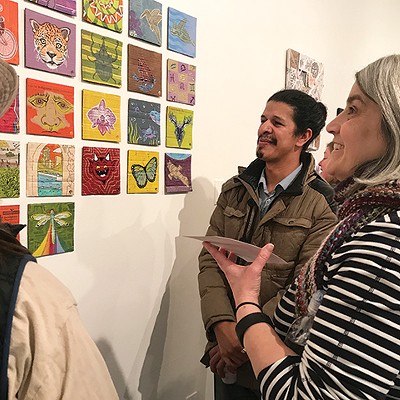Wallace is the owner of Abay (pronounced ah-BY), which opened in East Liberty in June 2004. Wallace is a handsome, dark-eyed man whose mother is white and father is African American. "I am not Ethiopian," he says, but as a student and later a lawyer, he spent time traveling around the world. After dining in many nations and U.S. cities, he decided to introduce Pittsburgh to Ethiopian cuisine. "Our slogan on our T-shirt," he says wryly, "is 'Working Vacation, Accurate Stereotype, Ethiopian Food: One of the above is not an oxymoron.'"
Ethiopia is a country with a 2,000-year history, he continues. It was never colonized, although it was briefly occupied by Italy from 1936 to 1941. "It's a hybrid of sub-Saharan Africa and the Middle East," which intrigued him, he says. When people ask him about the food, he says, "It looks like Indian food, but it doesn't taste like it."
Two things you should know about eating at Abay: The restaurant, like the culture on which it is based, emphasizes communal eating and injera. The latter is flat, pancake-like bread on which the food is served. To eat, peel off pieces of the bread, scoop food into it, and pop it into your mouth. Wallace explains that injera is primarily made from a grain called tef, which is indigenous to Ethiopia. "Injera is a staple," he says. "Even if you don't have anything else, you have injera."
Although the dishes resemble Indian food, the spice is berbere -- not curry -- a combination of red pepper, garlic, ginger, cloves and cinnamon. Its spice is subtle, leaving your tongue tingling, not burning. Injera is more like a tortilla than like nan. The flavor is almost bland, but there is an elusive sweetness. It's the perfect canvas for the food.
Of the dishes I sample on my lunchtime visit, the standouts are the pumpkin soup; fosolia, a lightly spiced mix of string beans, carrots and potatoes; and kik alitcha, yellow split peas in a yummy herb sauce. All the dishes are delicious, the fresh ingredients and subtle flavors complementing each other. Vegetarians, pay attention: The majority of the dishes are meat-free and in most cases, even vegan.
Wallace is proud that Abay features authentic traditional cuisine. "There are a lot of fasting days built into the culture," he expounds. The religious affiliations are split evenly between Ethiopian Orthodox Christians and Muslims. "They have entire fasting seasons, where they won't eat any animal products at all. ... They perfected these dishes over time," he adds. "You're not taking a meat-based dish and trying to make it vegetarian."
Wallace admits the menu has one exception to traditional cuisine. The doro minchet abish features chicken breasts, diced and cooked in a stew. "If we were in Ethiopia, it would be drumsticks and more the whole chicken," he says. "In a lot of developing countries, you use more of the whole animal." It's on the menu for American tastes.
"A lot of people who come here, it seems, are the type of people who are really open-minded and either well traveled or at least pretty cultured," Wallace enthuses. "They are here for the experience." Other people "want silverware and rice, which is fine," Jamie says. "They are here for the food and not necessarily for the authentic experience."
Abay has been received well and Wallace is excited to be part of an area undergoing a renaissance. "A lot of people thought this couldn't happen in Pittsburgh [but] it's been great." The community is incredibly supportive, he adds, concluding, "There are a lot more open-minded people in this city than I even realized."


















